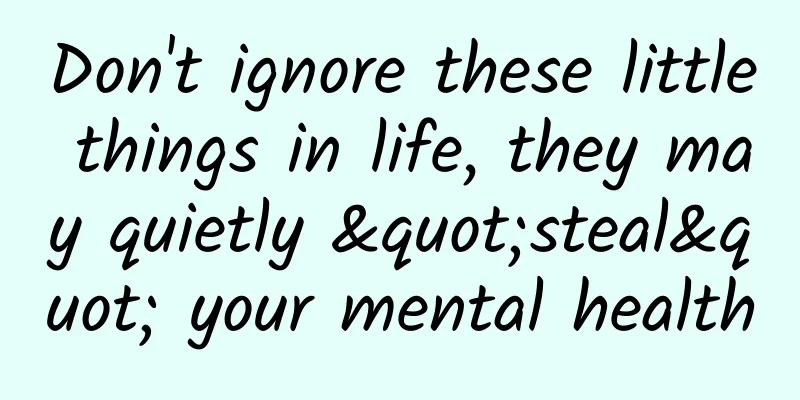Don't ignore these little things in life, they may quietly "steal" your mental health

|
In modern society, people's pace of life is getting faster and faster. They are often busy dealing with various pressures from work, study and family. Mental health is also facing unprecedented challenges. As autumn comes, the weather gradually becomes cooler, but some people will be saddened by the scene. This season is also the peak season for depression. No wonder some people say that autumn has a "stern and killing atmosphere". Today (October 10) is the 33rd World Mental Health Day , with the theme of "Co-construction, Co-governance and Sharing, Working Together for Health and Peace of Mind". In daily life, what are some inadvertent "little habits" that will have a profound impact on our mental health? Over-reliance on social media Browsing mobile phones and tablets before going to bed has become a normal part of modern people's lives, but staring at the screen for a long time will not only lead to decreased vision and neck and back pain, but more importantly, it will interfere with our sleep cycle and emotions, affecting our physical health. Looking at the "success studies" and "chicken soup for the soul" on the Internet constantly evokes our confusion and frustration, increases anxiety, and even affects our daily routines; virtual interactions cannot replace real face-to-face interactions, making people increasingly lonely, and over time, they fall into a vicious cycle of negative emotions. Irregular eating and sleeping habits Diet is not only related to physical health, but also closely linked to mental health. Although high-sugar, high-fat, and high-salt foods can temporarily improve mood, long-term intake will lead to weight gain and blood sugar fluctuations, which in turn affect mood and cognitive function. On the contrary, a balanced diet with more vegetables, fruits, whole grains, and high-quality protein can help stabilize blood sugar levels and improve mood. In addition, staying hydrated is also important. Dehydration can cause headaches, fatigue, and even increase anxiety. Long-term irregular work and rest schedules can disrupt the body's biological clock, leading to insufficient sleep or poor sleep quality. Lack of adequate rest can not only make people feel exhausted, but also affect emotional stability and increase the risk of anxiety and depression. Lack of real interests and hobbies For people with hobbies, it is not only a form of entertainment, but also a way to make life full of vitality. It is an important way for personal growth and self-realization. The lack of hobbies means a lack of channels for self-exploration and expression, which may cause life to become monotonous and lack goals and motivation. In the long run, individuals may feel empty, bored and dissatisfied, and even have doubts and anxiety about their self-worth. In addition, hobbies are also an important way to communicate with others and establish social relationships. Lack of hobbies may limit social activities, increase the risk of loneliness and social isolation, and thus have a negative impact on mental health. Avoiding emotions and ignoring one’s own emotional needs Emotional needs are an important part of basic human needs. When these needs are not met, people may feel lonely, lost and ignored, which may lead to psychological problems such as anxiety and depression in the long run. In addition, ignoring one's own feelings will lead to emotional repression, which will accumulate deep in the heart, forming psychological pressure and causing serious impact on physical and mental health. If emotional needs cannot be expressed, personal self-awareness and emotional development will also be restricted, making it difficult to form healthy self-cognition and emotional regulation abilities. Mental health is related to individual happiness, family harmony, and social harmony. There is a close relationship between mental health and physical health. By adjusting diet and daily routine, exercising regularly, strengthening healthy social interaction, and cultivating interests and hobbies, we can build a solid defense line for our mental health. Comprehensive sources: National Health Commission, Xinhuanet, etc. The pictures and cover picture of this article are from the copyright gallery. Reprinting and using them may cause copyright disputes. |
Recommend
6,000 clicks, 5 conversions? It’s this influencing factor that’s causing all the trouble!
Do you know what is the ultimate factor affecting...
If you learn these tricks, you will be a qualified event operator.
Event Operations As an event operator, you will u...
The new media red ocean is approaching. How can corporate new media make a second breakthrough in 2017?
It is standard for companies to have new media ac...
"Surpassing" GPT-4 in all aspects, approaching human comprehension ability! Is the world's most powerful model really here?
Recently, Anthropic, a large model company known ...
Today in Science and Technology History | The world's deepest known ocean blue hole is in Sansha, my country
Ocean blue holes are rare natural geographical ph...
After giving away tablets and mobile phones, Lei Jun gave away 14,000 devices. What does Meizu think?
After the Xiaomi Tablet was priced at 1,299 yuan,...
Wilson: New Energy Vehicle Industry Monthly Report in June 2019
1. Overall performance of the new energy passenge...
The first cancer vaccine trial program with a scale of 1,000 people has been launched, marking a "milestone moment" in cancer treatment
Humanity may have taken a big step towards curing...
Counterpoint: Global electric vehicle battery market to grow 19% year-on-year in the first half of 2024
The global electric vehicle battery market grew 1...
The Guanghan Palace is full of distinguished guests. How did the moon become a popular check-in spot step by step?
Time flies, and in a blink of an eye, it has been...
The dog days are over, are cooler days coming?
Popularize science and spread science to the publ...
How to promote Xiaohongshu? 2 steps!
In fact, most of the Xiaohongshu merchants are mo...
Do you dare to challenge a cup of cockroach milk?
Key Points ★ "Cockroach milk" is not or...
Experienced APP operators, is this how they attract users?
If you think of an APP as a car, then the operato...
Google Android makes important changes! Some low-memory devices are no longer supported
On July 22, according to XDA reports, a recent in...









